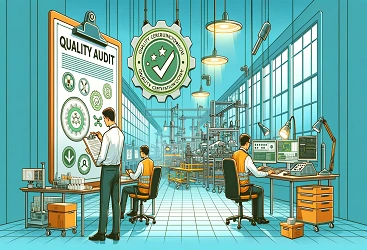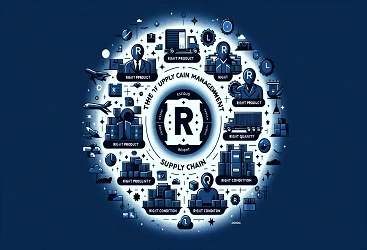What is Quality Audit?
A quality audit is a procedure in which a team of auditors, either internal or external, thoroughly examines a quality system. It is a key component ...
By AMREP | Posted on March 24, 2022
Updated on December 12, 2023

When you use a new supplier, start new production operations, or shift your manufacturing overseas, there is often a great mismatch between your quality manufacturing expectations and your supplier. It becomes very difficult to enforce your quality leadership and Quality Management Systems on your suppliers, especially if you have hundreds of suppliers spread out in multiple locations and countries.
Managing your outsourced suppliers is about applying the right quality control tools at the right time. Here is a quick run-down on some of the tools you can use:
A scientific method for determining the maximum number of defective units you are prepared to accept in each production batch. This tool should be used not just in the pre-shipment stage but also in the supplier’s materials selection processes. Suppliers should also have a systematized way of accepting and rejecting components and materials. The AQL consists of a table that sets out the inspection level for varying lot sizes and the maximum defect threshold.
Read More - Third-Party Quality Companies To Check Verified Suppliers
Best applied to suppliers when you have a short-term or one-off supply relationship or you don’t really know the supplier. This inspection is usually used for simpler products that don’t have complex quality requirements.
This is the best problem prevention tool to reduce your unexpected procurement and financial losses. An audit is your opportunity to find out as much as you can about your prospective supplier before signing the purchase contract. In your audits, you should aim to get a comprehensive insight into your supplier’s financial, technical, production, quality control, personnel management, and customer handling capabilities.
To be used continuously if the supplier is new, or if the production volume is large, continuous, and long-term. Process or line inspections involve inspecting the product during the production process, rather than at the end. This allows defects and manufacturing problems to be detected early.
Best applied on new product production launched by new or existing suppliers to remove Critical to Quality and Critical to Usability problems. They can be applied at the system, subsystem, design, process, and service delivery levels. The main objective is to determine failure situations, assess their risk level, and evaluate how they can adversely affect performance.
Read More - How to Effectively Manage Your Suppliers in Mexico
A necessary tool when component conformity and compliance are critical in the production process. It is used mainly by the automotive and aerospace industries. PPAP defines the approval process for new or revised parts, or parts produced from new or significantly revised production methods. It essentially involves checking all the documentation, risk assessments, sample production parts, and production processes before manufacturing starts.
Essential for preventing recurring quality problems or product defects. CAPA is an investigative process that looks into the root causes of a problem and the corrective actions that can be taken to prevent it from happening again.
The best method for ensuring quality and performance through thorough planning. Developed by the automotive industry and used mainly in advanced product manufacturing, the objective of the APQP is to produce a product quality plan that enables products that satisfy the customer to be developed. It looks into aspects such as design robustness, design testing, specification compliance, production process design, quality inspection standards, process capability, manufacturing techniques, and risk management.
For ensuring precise quality control in your suppliers’ production and developing continuous improvement practices. It involves using a number of statistical methods to monitor manufacturing processes for significant variability from specified parameters. Control charts are one of the most common tools used in this analysis.
The ASQ (American Society for Quality) also has a fantastic resource section where you can learn more about these quality control tools.
In conclusion, effective management of an outsourced supply chain requires a strategic deployment of quality control tools at various stages of the production process. From the meticulous application of AQL to the insightful use of Factory Audits, Process and Line Inspections, FMEA, PPAP, CAPA, APQP, and SPC, each tool plays a crucial role in ensuring the quality and reliability of products sourced from diverse suppliers. Implementing these tools not only minimizes defects and production issues but also fosters a proactive approach to quality management, contributing to enhanced customer satisfaction and sustained business success in the dynamic landscape of global supply chains.
Contact Us To See What We Can Do
Call Us
Mon - Sat 9.00 - 18.00
Sunday Closed


21 - September 2023
21
September
2023
A quality audit is a procedure in which a team of auditors, either internal or external, thoroughly examines a quality system. It is a key component ...

14 - October 2022
14
October
2022
Supply chain management (SCM) is the process of planning, measuring, and monitoring the flow of goods and services from the suppliers to the end customer...

19 - March 2022
19
March
2022
AMREP Supplier Management Services is back again working in the Defense Electronics industry. Previously our work was on night vision ...
